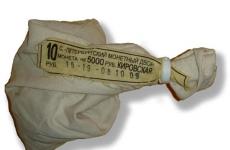Who does Miller Gazprom live with now? The most luxurious palace in the Moscow region (17 photos)
Miller Alexey Borisovich– Chairman of the Board and Deputy Chairman of the Board of Directors of OJSC Gazprom. Candidate of Economic Sciences
Photo: http://forums.drom.ru/garazh/t1151474477.html
Alexey Miller, biography
Alexey Miller was born on January 31, 1962 in Leningrad, his parents were “Russian Germans”. Miller studied at school-gymnasium No. 330 in the Nevsky district of Leningrad, after school he entered the Leningrad Financial and Economic Institute. ON THE. Voznesensky, who graduated in 1984 with a degree in economics and got a job at LenNIIproekt. In 1986, Miller entered graduate school at LenNIIproekt, from which he graduated in 1989, defending his Ph.D. thesis
Alexey Borisovich Miller in the eighties of the last century was part of the circle of Leningrad economists-reformers, in which Anatoly Chubais was the informal leader. Also, since 1987, Alexey Miller was a member of the Sintez club, which in addition to him included Dmitry Vasiliev, Mikhail Dmitriev, Andrei Illarionov, Boris Lvin, Mikhail Manevich, Andrei Lankov, Andrei Prokofiev, Dmitry Travin and others. The club met at the Leningrad Youth Palace.
Career of Alexey Miller
Alexey Miller worked at LenNIIproekt in 1990 as a junior researcher. In the same year, Miller was invited to work on the Economic Reform Committee of the Lensovet Executive Committee. From 1991 to 1996, he worked in the Committee for External Relations of the St. Petersburg City Hall under the direct supervision of Vladimir Putin (who at that time served as head of the Committee for External Relations of the City Hall), Alexey Miller was Putin’s deputy and head of the department of foreign economic relations. Alexey Borisovich Miller was involved in the development of the first investment zones in the city, in particular Pulkovo (construction of the Coca-Cola and Gillette factories) and Parnas (construction of a complex of buildings for the Baltika brewing company).
Alexey Miller left Smolny after Anatoly Sobchak lost the election for mayor of St. Petersburg to Vladimir Yakovlev in 1996. Miller moved to work at OJSC Sea Port of St. Petersburg as Director for Development and Investments. In 1999, Miller was appointed general director of OJSC Baltic Pipeline System. A year later, in 2000, Alexey Borisovich Miller became Deputy Minister of Energy of Russia, overseeing issues of foreign economic activity. Miller is credited with the fact that thanks to the cooperation of the Ministry of Energy with OPEC, he managed to maintain a fairly high price for oil on world markets.
In January 2001, information appeared in the media that Alexey Miller could become the successor to Energy Minister Alexander Gavrin, but on May 30, 2001, Miller was elected chairman of the board of Gazprom.
Alexey Miller, Gazprom
Alexey Miller came to Gazprom in 2001, replacing Rem Vyakhirev as chairman of the board. In the same year, Miller first took the post of Chairman of the Board of Directors of CJSC CB Gazprombank (later CJSC Joint Stock Bank Gazprombank; OJSC Gazprombank). There were reports in the media that the company's management learned about Miller's appointment an hour before the start of the board meeting - during a conversation with the president in the Kremlin. On May 6, 2002, the government appointed Alexey Miller as a representative of the state as a shareholder to participate in the annual meeting of shareholders of the company.
At the end of 2004 - beginning of 2005, Gazprom, under the leadership of Alexey Miller, advocated increasing the price of gas supplied abroad. At the end of October 2005, a group of minority shareholders of the Yukos oil company filed a class action lawsuit in the Washington District Court against the Russian Federation and a number of Russian energy companies, as well as their executives (including Alexei Miller) and ministers, they were accused of conspiring to “actually nationalization" of the company.
On May 7, 2008, Dmitry Medvedev took office as President of Russia, after which Alexey Miller became acting chairman of the board of directors of Gazprom for the period until the annual meeting elected a new board. On June 27, 2008, First Deputy Prime Minister of Russia Viktor Zubkov was elected as the new head of the board of directors of the gas monopoly, and Alexey Miller took the position of his deputy. In March 2011, Alexey Borisovich Miller was re-elected chairman of the board for a five-year term. In November 2012, Russian Forbes compiled a ranking of the highest paid top managers in Russia, and Miller took second place in it. The publication estimates that Miller's income is about $25 million a year.
Alexey Miller, awards
- Order of Merit for the Fatherland, IV degree (2006);
- Order of Alexander Nevsky (2014);
- Medal of the Order “For Merit to the Fatherland”, II degree;
- Order of the Cross of the Hungarian Republic, II degree (Hungary) - for services in energy cooperation;
- Order of St. Mesrop Mashtots (Republic of Armenia);
- Order of Dostyk II degree (Kazakhstan) - awarded on the basis of the Decree of the President of the Republic of Kazakhstan dated October 2, 2006 for contribution to the strengthening and development of cooperation between the Republic of Kazakhstan and the Russian Federation;
- Order of Honor (South Ossetia, August 24, 2009) - for services to strengthening friendship and cooperation between peoples, great personal contribution to the construction of the Dzuarikau - Tskhinvali gas pipeline;
- Grand Officer of the Order of Merit of the Italian Republic (Italy, February 12, 2010);
- Order of St. Sergius of Radonezh, II degree (ROC);
- Order of St. Seraphim of Sarov, 1st degree (ROC, 2009);
- Order of Glory and Honor, II degree (ROC, 2013) - in recognition of works for the benefit of the Russian Orthodox Church and in connection with the 300th anniversary of the founding of the Alexander Nevsky Lavra;
- Honorary citizen of the city of Astrakhan (2008);
- Prize of the Government of the Russian Federation in the field of science and technology (2010);
- Order of the Nizhny Novgorod Region “For Civil Valor and Honor”, 1st degree (2010);
- Order of Labor, 1st class (Vietnam, 2011);
- Certificate of Honor from the President of the Russian Federation (February 6, 2012) - for services to the development of the gas complex and many years of conscientious work.
Personal life of Alexey Miller
Alexey Miller is married and has a son. Alexey Borisovich Miller is fond of horse riding and owns two thoroughbred stallions.
Childhood, youth and family of Alexey Miller
Now a successful top manager, chairman of the board of the largest Russian energy company, he was born in Leningrad into a family of employees of a closed military enterprise. Miller studied at gymnasium No. 330, demonstrating excellent academic success from an early age. After school, he easily entered the Leningrad Financial and Economic Institute. N.A. Voznesensky, who successfully graduated in 1984 with a degree in economics and engineering.For several years after receiving his diploma, Miller worked in his specialty at LenNIIproekt, however, being a capable student, in 1986 the future Gazprom employee decided to continue his studies in graduate school. In 1989 Miller became a candidate of economic sciences.
In 1990, he continued his work at LenNIIproekt, where he now holds the position of junior researcher. Part of 1990 and early 1991 - Miller works on the Economic Reform Committee of the Lensovet Executive Committee.
Alexey Miller’s career rise: from St. Petersburg mayor’s office to Gazprom
In 1991, a fateful acquaintance took place for Alexei Borisovich. This year he began his work in the Committee for External Relations of the St. Petersburg City Hall, where the current President of the Russian Federation V.V. Putin held the position of his head. Miller worked on the Committee for five years. During this time, the organization managed to establish contacts with the largest Western banks.Alexey Miller (OJSC Gazprom) in the oncoming lane. A593MR 97
The change of power forced Alexei Miller to leave his home. Having risen high through the ranks of the External Relations Committee, Miller became a sought-after candidate for senior positions in major Russian companies. His new place of work was the company OJSC Sea Port of St. Petersburg, where Alexey Miller worked for three years.
Since 1999, the successful top manager took the place of general director at OJSC Baltic Pipeline System.
According to the results of the Russian elections in 2000, Vladimir Putin occupied the presidency. Following his former boss, his former subordinate Alexey Miller also moved to the capital. He was appointed to the post of Deputy Minister of Energy of the Russian Federation, but remained in office for only a year.
In 2001, Miller became chairman of the board of Gazprom. The dismissal of Rem Vyakhirev, who served as chairman for almost ten years, promises the largest energy organization rapid reforms, which were not long in coming. From this moment, Gazprom becomes completely controlled by the state, and work begins to return assets lost during Vyakhirev’s rule.
Alexey Miller: crests are messing with Russian gas
In 2002, Alexey Miller became Deputy Chairman of the Board of Directors of OJSC Gazprom. By this time, the organization had undergone major personnel changes. Being far from the energy sector, Miller needed people for whom this field was not alien. A number of leadership positions went to people with whom the new chairman of the board had already worked; other appointments came from the Kremlin; some members of Vyakhirev’s team managed to retain their posts.
However, despite the reforms being carried out, evil tongues foreshadowed Miller's imminent resignation. The beginning of his work was not active enough, and, according to some experts, the personnel changes that began should have ended with the resignation of the new leader. No matter what rumors circulate, and no matter what is whispered about on the sidelines, Alexey Miller has firmly strengthened his position. By 2004, the formation of a renewed management apparatus came to an end. In 2006, Miller's work contract was extended for another five years.

No matter how controversial and dubious the start may seem, Alexey Miller achieved good results as chairman of the board. In 2010, the American magazine Harvard Business Review ranked Miller third in the ranking of the world's most effective top managers. In 2013, the chairman of the board of OJSC Gazprom took third place in the Forbes list, and was named one of the most expensive Russian managers.
Personal life of Alexey Miller
Alexey Miller is a busy man, which is why he doesn’t have time to communicate with journalists, so the few interviews with the head of Gazprom are devoted mainly to the work of the company, its prospects and development. Miller prefers not to talk about his personal life, but it is known that he has been married for many years.He and his wife Irina are raising a son. The top manager prefers to spend his free time with his family. He is no stranger to sports hobbies, such as cycling and skiing. Miller is also passionate about equestrian sports.
He owns several thoroughbred stallions. However, like any business person, Miller’s hobby resulted in active work. In 2012, he assumed the position of Chairman of the Board of Directors of OJSC Russian Hippodromes. According to the presidential decree, Alexey Miller faces the responsible and difficult task of breathing life into domestic equestrian sport and contributing to the revival of the industry.
In 2016, the entrepreneur admitted that as a child he passionately wanted to go to the concert of his beloved Deep Purple. It was impossible then, so now he attends every performance of his youth idols whenever possible.
Alexey Miller today
In 2016, Alexey Miller for the first time topped the ranking of the highest paid top managers, presented by Forbes. His annual remuneration was estimated at $17.7 million.Alexey Miller is the highest paid manager in Russia, head Gazprom", and is also present on the board of directors of such companies as Gazprombank, NPF Gazfond, SOGAZ, OJSC Russian Hippodromes.
Biography of Alexey Miller
Alexey was born in 1962, his homeland is the city of Leningrad, where he graduated from school with excellent marks, but due to circumstances he never received a gold medal. According to his peers, he was generally an unremarkable, quiet child. Afterwards, he easily entered the Department of National Economy and continued his studies at the University of Finance and Economics. Here the young man also had no problems with his academic performance; from the first day he became an excellent student. Of all his student hobbies, Alexei only recognized football, rooting for his native Zenit, which he provides financial support to this day.
After graduation, Miller was invited to work at LenNIIproekt. After working there for some time, the young man then attended graduate school and successfully defended his dissertation. At this time, Alexei Miller’s attention was drawn to the “Club of Young Economists”, where at that time unknown young but very ambitious people spoke, who in the future became the first persons of the state. The club was led by Anatoly Chubais, and Miller regularly attended every meeting of the club and listened to the reports of the participants. After perestroika in 1990, the club, whose members, including Chubais, soon took high positions in politics, also collapsed. Alexey Miller, meanwhile, was appointed to the economic committee of the Leningrad City Executive Committee, which, however, was liquidated a year later.
Miller, meanwhile, was not idle. Very soon, guided by the trust of his longtime acquaintance Chubais, he headed the Committee on Foreign Economic Relations, which was established at the city mayor’s office. During these years, Miller’s career was more than successful: within five years he became deputy chairman of the Committee on Foreign Economic Cooperation. During his service, Alexey was able to establish himself as an efficient employee who strictly carries out instructions and is not involved in political intrigues and scandals.
By the nature of his work, Miller conducted business in the Pulkovo economic control zone; his main achievements during these years were that he attracted representative offices of large foreign banks to St. Petersburg, for example Lyon Credit and Dresdner Bank, and generally established the flow of investments from abroad.
In 1996, after leaving the post of mayor, Sobchak forced the release of his posts and his entire team, including Miller, who became deputy head of Sea Port OJSC. And very soon he took up the post of director of the Baltic Pipeline System.
After an internship as Deputy Minister of the Ministry of Energy, Alexey, contrary to expectations, did not take the place of minister, but became the head of the Gazprom company. The company's operations underwent many reforms, including a controlling stake in the company becoming owned by the state, as well as the company's treasury, which financed many government needs. Miller achieved success in the international field, establishing the import of raw materials to Europe and increasing it to 40%.
Office of OJSC Gazprom in Moscow
Construction in 2010 was also authorized by the new head of Gazprom, who also plans to build South Stream through the Black Sea.
In 2013, Alexey Miller was awarded third place by Forbes magazine and was named the most successful manager in Russia.
– a diligent student and efficient employee, this is how his acquaintances and friends saw him in his youth and see him now. Coming from a simple family, he became one of the richest businessmen in Russia, taking the helm of the main enterprise in the Russian oil and gas industry. We have prepared a special photo report about notebooks, personal stallions, millions of US dollars and love for Alexey Miller’s yachts.
A key role in the fate of Alexey Miller was played by his colleague on the External Relations Committee (FRC) of the St. Petersburg City Hall. It was his immediate supervisor in 1991, Vladimir Putin. After Putin became president of the Russian Federation in 2000, his former subordinate Miller moved to Moscow and took the post of Deputy Minister of Energy of the Russian Federation. Alexey Borisovich Miller appeared at Gazprom in 2001 as chairman of the company’s board. Also, since 2001, he has been Deputy Chairman of the Board of Directors of the companies "", "" and "".
Here are entertaining excerpts from the article “Alexey Miller’s School Notebooks,” which was written by one of his classmates:
“My parents were simple people. Miller also did not come from aristocrats: his father was an assembly mechanic, his mother was an engineer. Both worked at the same enterprise - NPO Leninets, which still develops on-board equipment for aircraft. Alyosha’s father died early from cancer, and his mother is still alive.He was the only child in the family.
This episode was told to me by Alexei Borisovich’s classmate Alla. Lesha Miller never skipped class. One day the class gathered for an excursion to Pushkin. The head teacher said: “Take thermoses with you. But just in case, take notebooks as well: the excursion may be canceled and then you will study.” Everyone came to school with only thermoses. Only two excellent students - Miller and Kibitkin - brought notebooks, as was said. When they announced that the excursion would be cancelled, everyone fled out of town, but Kibitkin and Miller stayed behind. It seems that even in short pants he knew what he wanted..."
“The hyper-cautious Alexey Borisovich not only ran from floor to floor with pieces of paper and solved his career problems. He also helped Peter get loans. According to some analysts, a number of large Western companies - Coca-Cola, Wrigley, Gillette and others took root on the banks of the Neva, in no small part thanks to Miller. He, along with Putin, brought large Western banks such as Dresdener Bank and Lyon Credit to the city and generally played a key role in attracting foreign investment. He handled all the issues competently "Skeptics, however, reduce Putin's favorite to a cog in the machine of nomenklatura office work. “All things,” they say, “were personally driven by Sobchak and his advisers. Miller was not assigned serious topics due to lack of experience." "Arrogant, touchy, complex. Unpleasant to communicate with. Having become a big boss, he could force the Western delegation to wait 30-40 minutes in his reception room. At the same time, the manager is zero... The key color in the description is gray. I walked along the wall." But the truth is that Miller was at the origins of the creation of the first investment zones in the Pulkovo Heights area. He also represented the interests of the city in joint ventures and oversaw the hotel business - he was on the board of directors of the Europe Hotel.
You can learn more about the life of the king of Gazprom from our PHOTO REPORT.
Alexey Borisovich Miller— Chairman of the Board and Deputy Chairman of the Board of Directors of PJSC Gazprom. Alexey Miller is also the chairman of the board of directors of NPF Gazfond, Gazprombank and the insurance company SOGAZ. Alexey Miller is one of the highest paid Russian managers. Candidate of Economic Sciences. Miller has a number of state awards, including the Order of Merit for the Fatherland, IV degree (2006) for his contribution to the development of the Russian gas complex and the Order of Alexander Nevsky (2014).
Alexey Miller is a member of the board of trustees of the International Global Energy Prize and the government commission on the production of the mineral resource base of the Russian Federation and fuel and energy complex issues.
Childhood and education of Alexey Miller
Alexey Miller comes from a family of Russified Germans.
Father - Boris Vasilievich Miller(1935−1986) - assembler.
Mother - Lyudmila Aleksandrovna Miller(1936−2009) - engineer.
Parents worked at the Radio Electronics Research Institute of the USSR Ministry of Aviation Industry.
Alexey Miller graduated from school-gymnasium No. 330 in the Nevsky district of Leningrad. Young Miller studied successfully. After school, he immediately entered the Leningrad Financial and Economic Institute. ON THE. Voznesensky. In 1984, having received his diploma, Alexey Miller began working as an engineer-economist at LenNIIproekt.
From the biography of Alexey Miller on Wikipedia, you can find out that in the 80s, the future head of Gazprom was part of the circle of Leningrad economists-reformers, whose informal leader was Anatoly Chubais. In particular, in 1987, Alexey Miller was a member of the Sintez club at the Leningrad Youth Palace along with such famous people as Mikhail Dmitriev, Andrey Illarionov, Mikhail Manevich, Andrey Lankov, Andrey Prokofiev and others.
The beginning of the career of Alexey Miller
While working at LenNIIproekt, Alexey Miller continued his education by studying in graduate school. In 1989, Alexey Borisovich Miller defended his Ph.D. thesis and took the position of junior researcher at LenNIIproekt.
In addition, the biography of Alexey Miller notes his activities in the Committee on Economic Reform of the Executive Committee of the Leningrad City Council.
In 1991, a significant acquaintance took place for Alexei Borisovich’s future career. Alexey Miller’s biography on the “Find out everything” website reports that in 1991 he began working in the Committee for External Relations of the St. Petersburg City Hall, where he was director Vladimir Putin. Miller’s biography on the Gazprom website states that Alexey Borisovich began his career in the mayor’s office as head of the market conditions department of the Foreign Economic Relations Department of the External Relations Committee of the St. Petersburg Mayor’s Office.
Alexey Borisovich Miller successfully served on the Committee for five years and managed to establish contacts with the largest Western banks. Miller's biography in Lentapedia notes that he was involved in the development of the first investment zones in the city, in particular Pulkovo and Parnas, brought the first foreign banks to the city, such as Dresden Bank and Lyon Credit, hotel business, was chairman of the board of directors of the Europe Hotel.
Alexey Miller then became head of the foreign economic relations department, working under the direct supervision of Vladimir Putin (who at that time served as head of the mayor's office's external relations committee).
The perestroika period gave Miller the opportunity to climb the career ladder. Alexey Miller was invited to senior positions in the largest Russian companies.
In 1996, after Anatoly Sobchak’s defeat in the elections, a new place of work appeared in the biography of the future head of Gazprom - OJSC Sea Port of St. Petersburg. Until 1999, Alexey Miller was the director of development and investment of this company.
Since 1999, Miller took the position of General Director at OJSC Baltic Pipeline System.
When Vladimir Putin was elected president of Russia in 2000, Alexey Miller moved to Moscow. He was appointed to the post of Deputy Minister of Energy of the Russian Federation. Alexey Borisovich worked in this position for only a year, since in 2001 Miller took over as chairman of the board of Gazprom.
In the photo: Moscow, May 30. Deputy Minister of Energy Alexey Miller became the new chairman of the board of Gazprom (Photo: Vladimir Rodionov and Sergey Velichkin)
Alexey Miller's career at Gazprom
Alexey Miller, with the help of Vladimir Putin, carried out reforms at Gazprom, as reported in his biography on Wikipedia, the result of this activity was that by the beginning of 2004, the Russian Federation owned 38.7% of Gazprom shares and had a majority on the Board of Directors.
By 2004, the formation of the updated Gazprom management apparatus came to an end. In 2006, Miller's employment contract was extended for another five years.
On December 9, 2005, the State Duma adopted amendments to the law “On Gas Supply in the Russian Federation”, according to which the share of shares owned by state-owned companies cannot be lower than 50% plus one share, and restrictions are also established for foreign citizens and companies.

In the photo: Governor of St. Petersburg Valentina Matvienko and head of Gazprom Alexey Miller during the signing ceremony of the cooperation agreement for 2006 (Photo: Grigory Sysoev/ TASS)
Gazprom's Wikipedia page states that in 2007, the company was included for the first time in the annual list of the hundred most respected firms and companies in the world according to the weekly Barron's. In May 2008, Gazprom became the third largest company in the world by capitalization.
In May 2008, the company had a maximum price and Alexey Miller noted that in 7-8 years its capitalization should grow from $365.1 billion to one trillion. But in the fall of the same year it collapsed to 77.1 billion, says Wikipedia.
At the beginning of 2010, head Alexey Miller took third place in the ranking of the most effective top managers in the world according to Harvard Business Review.
The work of Alexey Borisovich Miller has been repeatedly recognized as successful at the state level. In February 2016, news reported that Miller's contract had been extended for another 5 years.

In the photo: Russian President Vladimir Putin and Chairman of the Board of Gazprom PJSC Alexey Miller (from left to right), who received the Order of Merit for the Fatherland, 1st degree, at the ceremony of presenting state awards of the Russian Federation in the Kremlin (Photo: Mikhail Metzel/TASS)
In January 2018, Gazprom asked the Russian government to allow the company to sell its own gas on the St. Petersburg Commodity and Raw Materials Exchange (SPbMTSE) without any restrictions. As reported in the news, Alexey Miller sent this letter to the Prime Minister Dmitry Medvedev.
Relations between Gazprom and Naftogaz
A special place in the activities of Alexey Miller as the head of Gazprom was occupied by relations with the Ukrainian Naftogaz. The “gas wars” between Russia and Ukraine continued for years, and the situation became especially difficult after Euromaidan, when Kyiv stopped paying for gas. Then Vladimir Putin said that Gazprom would “supply gas only in the volumes that will be paid by the Ukrainian side a month in advance. What they pay is what they get.”
On June 2, 2014, Alexey Miller reported that the price of blue fuel for Ukraine could drop below $385.5 per thousand cubic meters as a result of a discount from Gazprom.
On June 16, due to regular non-payments by Naftogaz of Ukraine, Gazprom introduced a prepayment regime for gas supplies for Ukraine. In addition, Gazprom filed a claim with the Stockholm Arbitration Court against the Ukrainian government for a total amount of about $4.5 billion. Dmitry Medvedev, commenting on the news that Russia will supply gas to Ukraine only after advance payment and repayment of all debts, wrote: “The freebie is over.”
In July, Alexey Miller reported that Ukraine’s total debt for fuel supplied by Gazprom reached $5.29 billion. A total of 11.5 billion cubic meters of gas remain unpaid, which is comparable to the volume of annual Russian gas supplies to Poland.
“Ukraine’s reluctance in principle to pay for Russian gas is becoming chronic and once again shows that the transfer to prepayment provided for by the terms of the contract was the only right decision,” Miller emphasized.
On October 31, 2014, gas negotiations in the Russia-Ukraine-EU format ended in Brussels. A tripartite agreement was signed, which fixed the plan for gas supplies during the winter period. The first part was signed by the President of the European Commission Jose Manuel Barroso, Vice-President of the European Commission Gunter Oettinger, Minister of Energy of the Russian Federation Alexander Novak and head of the Ministry of Energy of Ukraine Yuri Prodan, the second document was signed by the heads of Gazprom and Naftogaz.
“We, citizens of Europe, can say that gas supplies are secure this winter, we have achieved a breakthrough. Everyone benefited from this, especially EU citizens. The transit function of Ukraine will continue to be implemented. Countries such as the Czech Republic, Slovakia, and Hungary will receive sufficient volumes of gas,” said Günter Oettinger.

In the photo: Belgium. Brussels. October 31. Chairman of the Board of OJSC Gazprom Alexey Miller, Chairman of the Board of NJSC Naftogaz Andrey Kobelev (from left to right in the foreground) sign an agreement on the supply of Russian gas to Ukraine. In the background, from left to right: Russian Energy Minister Alexander Novak, European Energy Commissioner Günther Oettinger, European Commission President Jose Manuel Barroso and European Commission Vice-President for Energy Union Maros Šefčović (Photo: AR/TASS)
The European Commissioner for Energy also confirmed the points reached earlier, in particular, the $100 discount from the Russian Federation and Ukraine’s obligations to pay $3.1 billion of its debt. At the same time, until March 2015, as reported in the news, Ukraine could buy gas on an advance payment basis at a price of $385 per thousand cubic meters. meters of gas or lower, according to the calculation formula. It was noted that the key issue of the negotiations on October 30 was financial guarantees from the European Commission for payment by Kiev for Russian gas supplies.
In April 2015, Gazprom and Naftogaz signed an agreement on gas supplies in the second quarter of 2015.
In 2015, Gazprom filed a lawsuit against Naftogaz, demanding to recover from the company a fee for the shortfall of contract gas volumes in 2012-2013, which it had to pay according to the take-or-pay rule (“take or pay” - annual payment minimum amount of fuel). Naftogaz, in turn, demanded a review of pricing, which it considered non-market. In 2012, Square received a discount of one hundred dollars per thousand cubic meters of gas in exchange for basing the Black Sea Fleet in Crimea. But in 2014, after Crimea became part of the Russian Federation, the discount was canceled and the price rose to $485 per thousand cubic meters. Naftogaz refused to pay this price and also went to arbitration.
In the fall of 2015, Russia again provided Ukraine with a discount on gas. As the Deputy Head of the European Commission (EC) for Energy Union Affairs said Maros Šefčović, the “winter package” of documents, in addition to the trilateral protocol, included an additional contract between Gazprom and Naftogaz.
On November 18, 2015, the European Commission gave the green light to three gas pipelines from Southeast to Central Europe, which Gazprom can use to supply the Balkans with Turkish Stream gas. These projects allowed Gazprom to solve the problem of delivering gas to European consumers, while abandoning the transit of gas through Ukraine.
Thus, Russia was going to protect itself from a gas crisis similar to the crisis in 2009, when Ukraine stole gas. The head of Gazprom, Alexey Miller, made it clear that the Russian concern will not build “strings” in the EU to continue the Turkish Stream, and the Europeans themselves need to take care of this.
At the beginning of June 2016, Gazprom received an official letter from Naftogaz with a request to resume supplies of Russian fuel. Kyiv was offered a price of $177 per thousand cubic meters, but Naftogaz considered it too high. Gazprom then issued a preliminary invoice to Kyiv for gas.
On May 31, 2017, the Stockholm Arbitration Court issued an interim decision in the dispute between Gazprom and Naftogaz regarding the contract for gas supplies to Ukraine.
On February 28, 2018, the Stockholm Arbitration Court announced a decision on the transit claim of Naftogaz against Gazprom. It was ruled in favor of the Ukrainian company and obligated the Russian gas giant to pay Naftogaz $2.56 billion.
At the same time, Naftogaz demanded even more - $17 billion. Gazprom does not agree with the decision of the Stockholm Arbitration Court, accusing it of violating Swedish law governing the contract with Naftogaz. Gazprom promised to protect its rights “by all means” that do not contradict the law.
After this, the management of Gazprom announced that it had returned the advance payment for March to Naftogaz and would not resume gas supplies. As a result, the Ukrainian authorities temporarily limited gas consumption in the country, but within 24 hours the President Petro Poroshenko announced the start of fuel supplies from Poland, Slovakia and Hungary. As it turned out, this option turned out to be four times more expensive than the Russian proposal.
Commercial Director of Naftogaz Yuri Vitrenko stated that Gazprom had underpaid his company by about $20 billion since 2009 due to the fact that tariffs for fuel transit were underestimated.
Income of Alexey Miller
Alexey Miller is a regular participant in Forbes ratings, which list the incomes of the highest paid top managers in Russia. In 2013, with annual income of $25 million, Miller came in third place. In 2015, Alexey Borisovich for the first time became the highest paid top manager in Russia with an income of $27 million.

In the photo: Deputy Chairman of OAO Gazprom Vitaly Markelov, Chairman of the Board of OAO Gazprom Alexey Miller (from left to right) and Chairman of the Board of Directors of OAO Gazprom Viktor Zubkov (right) before the general annual meeting of shareholders of OAO Gazprom (Photo: Sergey Fadeichev/TASS)
At the end of 2016, Miller also topped the Forbes ranking of the most valuable executives of Russian companies with an income of $17.7 million.
According to Forbes, Alexey Miller owns 0.000958% of Gazprom shares. Package price: $488,198 (as of October 20, 2016).
On April 6, it became known that the United States had imposed sanctions against Russian businessmen and officials. The US Treasury blacklisted 15 companies and 38 businessmen, including Oleg Deripaska, Sergei Fursenko, Alexey Miller, Konstantin Kosachev, Mikhail Fradkov, Kirill Shamalov and some others.
This restrictive list implies the freezing of assets, seizure of real estate and possible bank accounts of individuals and legal entities in the United States, as well as a ban on entry into the country.
Personal life and hobbies of Alexey Miller
In the biography of Alexey Miller on the Find Out Everything website, it is reported that the billionaire is married, his wife Irina is not a public person. The Millers have a son.
Alexey Miller can often be seen at the matches of FC Zenit, whose general sponsor is Gazprom PJSC; it is known that he is a football fan.

In the photo: Chairman of the Board of OJSC Gazprom Alexey Borisovich Miller, and Sergey Fursenko, President of the Zenit football club (Photo: Vyacheslav Evdokimov / TASS)
Alexey Miller visited the locker room of St. Petersburg “Zenith” after the match of the ninth round of the Russian championship, in which the “blue-white-blue” were unable to beat Perm “Amkar”, the news reported. The functionary was extremely dissatisfied with the result of the match and decided to personally talk with the players.
Alexey Miller is fond of horse riding. He owns the purebred stallions Vesely and Fragrant. In the second quarter of 2012, Miller took the post of Chairman of the Board of Directors of OJSC Russian Hippodromes.
Forbes wrote that Alexey Miller registered on Odnoklassniki after an acquaintance with whom he studied at the institute reproached that the head of Gazprom communicates little with classmates on the Internet.
In 2016, during the international gas forum in St. Petersburg, Alexey Borisovich said that as a teenager he was a fan of Deep Purple. According to him, he dreamed of attending a concert and now, whenever possible, he attends performances of the legendary rock band.





